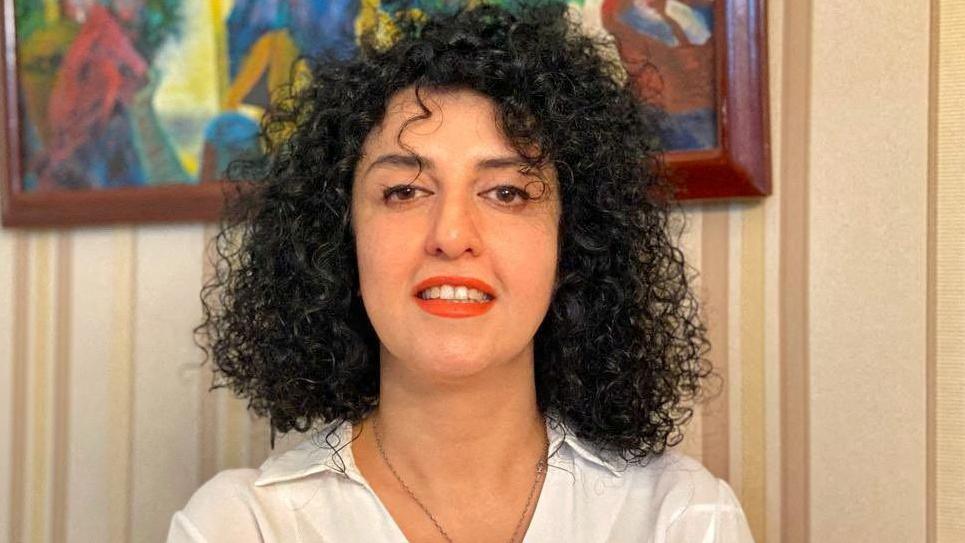Iran hands Nobel winner fresh jail term - lawyer

Narges Mohammadi had denounced the trial as “unjust and farcical”
- Published
A court in Iran has sentenced the jailed Nobel Peace Prize winner Narges Mohammadi to an additional year in prison, her lawyer says.
The 52-year-old human rights activist was convicted of spreading “propaganda against the system” by a branch of Tehran’s Revolutionary Court, Mostafa Nili wrote on X, formerly Twitter.
He said the reasons cited by the court included “comments about Ms Dina Qalibaf”, a student who alleged she was tortured and sexually assaulted by security forces, as well as her call to boycott March’s election and letters to Swedish and Norwegian MPs.
Ms Mohammadi had refused to attend the trial, denouncing it as “unjust and farcical”.
There was no immediate confirmation from the Iranian judiciary.
Iran Nobel laureate says she faces new trial
- Published18 May 2024
Iran extends Nobel Prize winner's prison sentence
- Published15 January 2024
Jailed women's rights campaigner wins Nobel Peace prize
- Published6 October 2023
Narges Mohammadi's family said in a statement that she had now undergone six trials over the past three years and been convicted four times, external for “protesting, exposing, and narrating sexual harassment and abuse by government officials”.
This had resulted in a “cumulative sentence of 13 years and three months in prison, 154 lashes, exile, and four months of street cleaning”, they added.
Ms Mohammadi was already serving a 10-year sentence at Tehran’s Evin prison, handed down in 2016, when she was awarded the Nobel prize last October for “her fight against the oppression of women in Iran”.
Last month, she had demanded that her latest trial be held in public so that witnesses and survivors could testify to what she alleged were "the sexual assaults perpetrated by the Islamic Republic regime against women”.
She said the propaganda charge was a result of a statement she had made in support of Dina Qalibaf, a student at Tehran’s Beheshti University and a freelance journalist.
In April, as authorities intensified a crackdown on women flouting Iran’s mandatory hijab laws in the wake of the 2022 nationwide protests, Ms Mohammadi had urged Iranians to stand against what she called the “war against women”, external.
In an audio recording released by her family, she called on women not to stay silent about abuse by security forces, but send their stories of "arrest, rape, harassment, humiliation and beatings" to her Instagram account.
The appeal, she said, was prompted by the “bruises and experience of sexual abuse” she had observed when Ms Qalibaf was brought to the women’s ward of Evin prison.
Ms Qalibaf was arrested a day after she posted an account on social media alleging that she had been subjected to electrical shocks by security forces and sexually assaulted by one officer at a Tehran metro station.
The judiciary-run Mizan news agency rejected Ms Qalibaf’s claims at the time. She was released on bail after two weeks in detention.
In December, a revolutionary court handed Ms Mohammadi an additional 15-month prison term after she was convicted in her absence of another charge of “propaganda against the system”, her family said.
She was also banished from Tehran for two years, and banned from travelling abroad, owning a mobile phone, or being a member of political and social groups for the same period.